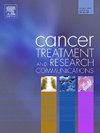认知生存模型:连接神经肿瘤学和神经学
IF 2.4
Q3 Medicine
引用次数: 0
摘要
认知障碍是癌症和神经退行性疾病的一种普遍但常被忽视的后果,严重影响患者的生活质量、日常功能和情绪健康。尽管病理不同,但两组都表现出相似的认知和心理症状,包括记忆丧失、注意力缺陷、抑郁、焦虑和照顾者紧张,这些症状在最初治疗后经常持续很长时间。这些症状可归因于共同的生物机制,如神经炎症、氧化应激和白质破坏。然而,认知健康在癌症或神经病学生存护理中很少得到系统的解决,导致对患者的长期支持存在差距。神经科学和康复科学的最新进展,包括认知训练、正念和身体活动等非药物干预的证据,强调了统一跨学科模型的潜力。数字卫生技术和远程卫生工具提高了可及性和可扩展性,特别是在偏远和服务不足的人群中。在这篇观点文章中,我们提出了一个认知生存模型(CSM),该模型整合了肿瘤学和神经学,从认知健康的角度重新构建了生存模型。该模式包括常规认知筛查、认知康复、心理支持、生活方式干预和护理人员培训等支柱,并得到数字化交付和政策宣传的支持。通过连接神经肿瘤学和神经学,该模型为以人为本、可扩展和跨学科的治疗后护理提供了路线图。我们提倡临床采用、政策改革和进一步研究,以在不同的医疗保健系统中验证和实施该模型。认知生存必须被认为不是一个专业的利基,而是一个全面的诊断后护理的关键组成部分。本文章由计算机程序翻译,如有差异,请以英文原文为准。
The cognitive survivorship model: Bridging neuro-oncology and neurology
Cognitive impairment is a prevalent yet often overlooked consequence of cancer and neurodegenerative diseases, substantially impacting the quality of life, daily functioning, and emotional well-being of affected individuals. Despite differing pathologies, both groups exhibit similar cognitive and psychological symptoms, including memory loss, attention deficits, depression, anxiety, and caregiver strain, which frequently persist long after the initial treatment. These symptoms are attributed to shared biological mechanisms, such as neuroinflammation, oxidative stress, and white matter disruption. However, cognitive health has seldom been systematically addressed in cancer or neurology survivorship care, resulting in gaps in long-term support for patients. Recent advances in neuroscience and rehabilitation science, including evidence for non-pharmacological interventions such as cognitive training, mindfulness, and physical activity, underscore the potential for a unified interdisciplinary model. Digital health technologies and telehealth tools have enhanced access and scalability, particularly in remote and underserved populations. In this Opinion article, we propose a Cognitive Survivorship Model (CSM) that integrates oncology and neurology to reframe survivorship from a cognitive health perspective. The model encompasses pillars such as routine cognitive screening, cognitive rehabilitation, psychological support, lifestyle interventions, and caregiver training, supported by digital delivery and policy advocacy. By bridging neuro-oncology and neurology, this model offers a roadmap for person-centred, scalable, and interdisciplinary post-treatment care. We advocate for clinical adoption, policy reform, and further research to validate and implement this model across diverse healthcare systems. Cognitive survivorship must be recognised not as a specialty niche but as a critical component of comprehensive post-diagnosis care.
求助全文
通过发布文献求助,成功后即可免费获取论文全文。
去求助
来源期刊

Cancer treatment and research communications
Medicine-Oncology
CiteScore
4.30
自引率
0.00%
发文量
148
审稿时长
56 days
期刊介绍:
Cancer Treatment and Research Communications is an international peer-reviewed publication dedicated to providing comprehensive basic, translational, and clinical oncology research. The journal is devoted to articles on detection, diagnosis, prevention, policy, and treatment of cancer and provides a global forum for the nurturing and development of future generations of oncology scientists. Cancer Treatment and Research Communications publishes comprehensive reviews and original studies describing various aspects of basic through clinical research of all tumor types. The journal also accepts clinical studies in oncology, with an emphasis on prospective early phase clinical trials. Specific areas of interest include basic, translational, and clinical research and mechanistic approaches; cancer biology; molecular carcinogenesis; genetics and genomics; stem cell and developmental biology; immunology; molecular and cellular oncology; systems biology; drug sensitivity and resistance; gene and antisense therapy; pathology, markers, and prognostic indicators; chemoprevention strategies; multimodality therapy; cancer policy; and integration of various approaches. Our mission is to be the premier source of relevant information through promoting excellence in research and facilitating the timely translation of that science to health care and clinical practice.
 求助内容:
求助内容: 应助结果提醒方式:
应助结果提醒方式:


